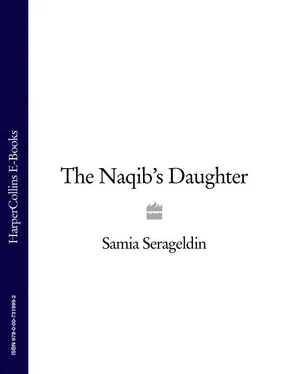She had been little more than a child at the time. Over their long years together she had grown from child-bride to trusted consort, consulted and cultivated by the powerful in Egypt and abroad. Until the day Ali Bey had been betrayed and assassinated. Nafisa tensed and held her breath, listening for the clatter of horses’ hooves, for the night watchmen dragging open the heavy wooden gates that closed off her neighbourhood. But it was only her overwrought imagination, and she lay back, winding a thick strand of hair around her palm. When the muezzin called for dawn prayers she would clap her hands and her maids would bring the mint tea she drank first thing every morning to keep her breath sweet all day. Even when she had gone on the pilgrimage to Mecca, two years ago, one of the camels in her caravan had carried nothing but pots of live herbs: mint, but also caraway for digestion, basil to stimulate appetite, and chamomile to rinse her hair. A cow plodded along, ensuring her diet of fresh milk and cheese. The Prince of the Pilgrimage leading the caravan from Egypt that year had made sure her every whim was accommodated.
Nafisa threw off her bedcovers; she was naked but for her fine silk shift. She was still beautiful, and still desirable. Was she not the same age as Khadija had been when she proposed to the Prophet Muhammad, and he a young man fifteen years her junior? Like Khadija, Nafisa had chosen a husband. A widow as young and wealthy as she could not remain without a husband and protector, and so she had opted for Murad, with his curly red bush of a beard heralding his choleric temperament like a banner. Among the senior Mamlukes, Murad had stood out by his ambition, but it was her status as the widow of Ali that raised him to the rank of co-regent of Egypt.
Today, Murad would be tested as no one could have imagined.
Until a week ago, her world had turned steadily on its axis. Her days were spent supervising the trading operations of her wikala, the caravanserai at Bab Zuweila, and overseeing construction of the charitable waterworks she was erecting nearby on Sugar Street. And along with the rest of Cairo she followed avidly reports of the rise of Elfi Bey’s new palace on the Ezbekiah Lake, and gauged the rise of his ambition as warily as the city leaders watched the peaking of the Nilometer before the summer flood.
Then came the news that English warships had dropped anchor off the port of Alexandria, looking for the French fleet. They had left, not finding their prey, but Egypt held its breath, waiting for the other shoe to drop. It had not been long in coming. The French fleet landed at the Bay of Alexandria two days later.
Last night her husband had gone to the judge’s house with old Ibrahim Bey and Elfi and the senior Mamluke commanders to devise a strategy. And Nafisa had lain awake, unable to sleep for only the second time in her life.
Nafisa started at the clatter of horses’ hooves followed by a shouted command and the scramble of the night watchmen to unlock and open the gates to the lane as her husband and his retainers approached. The servants bestirred themselves and fumbled to light torches with the haste bred by dread of their master’s temper. Nafisa’s maids hurried to her and she motioned for her Damascus silk slippers and robe. She slipped from room to room down the narrow, winding stone staircase, her robe sweeping the steps behind her, till she reached the mezzanine gallery with its arcades where, standing behind the wooden latticework mashrabiyya, she could look down on the central hall without being seen.
Murad had not come alone, there were two Mamlukes with him. As the servants scurried about, torches in hand, to fetch cushions for the wooden banquettes, Nafisa recognized Sennari, her husband’s right-hand man, by his great height and his ramrod posture, even before she caught a glimpse of his coffee-brown face with the tribal markings of his native Sudan etched deep into the cheek and chin.
The other Mamluke commander had his back to her, but something about his bearing, arrogant and wary at once, struck a familiar chord. At that instant he glanced over his shoulder and she recognized in his gesture that sixth sense that alerted him that he was being watched. It was Elfi himself.
The first time she had laid eyes on Elfi, Nafisa had been standing in this very spot. All of Cairo had buzzed about the peerless young Mamluke her husband had paid an extraordinary price for; it was said there was none to rival him for beauty or spirit, so wilful he had forced his first master to part with him, although no one knew exactly what he had done. She had waited behind the filigreed mashrabiyya for Murad to arrive with his latest acquisition, and peered down at the handsome blond Circassian. Murad had looked up at her triumphantly, and the blond head had tilted up, following his gaze. The Circassian had shot her a sharp glance from hard blue eyes, then faced forward again, impassive.
Murad had looked into the unflinching eyes of the young Mamluke and seen in him the prize racehorse of his stable; perhaps he had even seen in him his heir-in-arms, the heir he would never have from his own loins. For what Mamluke would wish upon a son of his flesh and blood to live by the sword and to die by the sword? For that they bought Mamlukes and trained them. Was it any wonder if they sometimes grew closer to them than they were to their own kin? Closer, sometimes, than they were to any woman.
Murad had looked into the hard eyes of the young Circassian and seen courage and intelligence. Nafisa had looked and seen a disquieting ambition. She had recognized a kindred spirit, she who had once been, like him, the possession of others, depending on beauty and wits for the favour of those who held her fate in their hands.
Twenty years later, Elfi Bey had earned envy and enemies with his fearsome reputation, his thousand Mamlukes and his half-dozen homes. The latest palace he had just completed on the Ezbekiah Lake was the talk of Cairo, with French chandeliers, an Italian marble fountain in the courtyard, and a library bidding to rival that of the venerable Azhar University itself. Nafisa had been proved right about Elfi’s ambition; she hoped Murad would be proved right about his loyalty.
Murad ushered his guests up the steps to the loggia with its arched colonnades, where the servants were laying out cushions and setting up round brass trays on wooden tripods. The men seemed to be arguing intensely, Murad’s blustery voice rising above Elfi’s deeper tones and Sennari’s laconic interjections.
Nafisa clapped her hands for the chief eunuch, and gave orders for breakfast to be prepared. The big brass pot of Yemeni coffee was to be brewed stronger than usual, as she suspected no one had slept that night. The cook was to begin baking the flaky butter pastry right away; if he had any sense, he would have lit his oven an hour ago. As she gave the eunuch the keys to the larder to bring out the day’s allotment of honey, butter and spices, she asked him, in an offhand tone, as if it were an afterthought, to report to her on the state of household stocks: how many sacks of wheat, rice, barley, lentils; how many jars of oil and clarified butter; how many bags of coffee, tobacco, sugar, nuts, spices; how many days’ worth of fodder for the horses and mules. Later she would send her chief eunuch to check the larder stocks in Murad’s three other houses around the city, and the Giza estate. Discreetly, of course; any rumours of a possible siege of Cairo would set the shopkeepers to hoarding goods and the residents to panicking.
Nafisa rather welcomed these mundane details; they would occupy her restless mind till Murad’s guests were gone and she could find out what course of action had been decided against the French advance.
* * *
Seventeen days. Elfi counted them. Seventeen days since he had occupied his brand-new Ezbekiah palace, and not even as many nights. He walked out on the terrace in the tepid morning breeze and inhaled the sharp scent of lemon trees mingled with the softer perfumes of jasmine and apricot. In a month the Nile would flood, and the parched lake basin before him would rapidly fill with water, and the Ezbekiah would come alive every night with torchlight and music, the boats gliding back and forth, the shopkeepers’ kiosks doing a bustling business in iced syrups and stuffed pancakes. Only seventeen days ago it had given him satisfaction to think that none of the houses around the Ezbekiah could compare, indeed no house in all of Cairo. Not one of the mansions of the great old man, Ibrahim Bey, nor those of Murad Bey, the master of Cairo, and his grand Lady Nafisa with her French friends and fancy furniture.
Читать дальше












